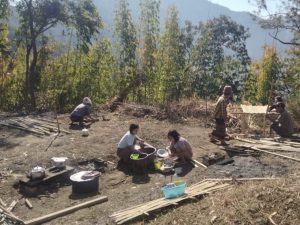Rajeev Bhattacharyya

The Indian government and civil society organizations are engaged in hectic efforts in the border state of Mizoram to rehabilitate refugees who have crossed over from Myanmar following a recent eruption of violent conflict between government troops and a rebel outfit.
As many as 589 refugees, including women and children landed at the border district of Lawngtlai in Mizoram, deputy commissioner Amol Srivastava told The Diplomat. “Efforts are on to provide them with assistance and rehabilitate them at different locations,” he said.
The influx from Myanmar’s Chin State to Lawngtlai, located 280 kilometers south of Mizoram’s capital Aizawl, began in batches early this month after armed clashes broke out between the Myanmar Army and the Arakan Army.
A local resident in Lawngtlai engaged in assisting the refugees claimed that most residents from the villages of Varang and Mretwa near Myanmar’s international border with India have landed in Mizoram after their villages were shelled by the Tatmadaw, as the Myanmar military is also known.
Another government official quoted the media as saying that the refugees have taken shelter in the villages of Zochachhuah, Laitlang, Hmawngbuchhuah and Dumzautlang with relatives or in vacant houses. The total number of refugees in the district has gone up to 5,909 as there were previous batches which arrived after they were evicted from their homes in Chin State following the military coup last year.
Similar to the situation in the state's other districts, the Myanmar nationals are being assisted by the government, NGOs, churches, student organizations and village authorities with food and other materials. Some local residents have also appealed for donations to support the evicted families.
The Arakan Army is a rebel outfit of local Buddhists that was founded on April 10, 2009. It is the armed wing of the United League of Arakan, and is led by its commander-in-chief Twan Mrat Naing. It is demanding autonomy and is part of an alliance of rebel armies called the Northern Alliance.
In November 2020, the Arakan Army entered into an informal ceasefire with the junta resulting in a cessation of conflict in the area. The peace lasted only for 18 months until the middle of this year when clashes erupted between the two sides.
Four Indian states share borders with Myanmar over a long distance spanning 1,643 kilometers. Two of these states, Mizoram and Manipur, have been impacted directly by the conflict.
In Mizoram, while local residents have extended whole-hearted support to the refugees, the influx has prompted the Manipur government to launch a selective crackdown in a bid to discourage more people from crossing the border.
In Mizoram, a total of 30,401 people have taken refuge in different regions of the state since the coup last year in Myanmar with the maximum numbers in Champhai, Serchip and Saiha, according to an estimate by the government. The Mizoram government has informed the state assembly that identity cards have been issued to 30,177 Myanmar nationals so far.
The current situation in Lawngtlai is a replay of the episode in 2017 when around 1,500 Myanmar nationals streamed into the district following clashes between Arakan Army and Myanmar military. The crisis had erupted at Paletwa and the adjacent region after 11 Myanmar Army personnel were killed on the Kaladan River in an ambush by the rebel outfit. Some refugees had told this correspondent then that the army had burned many houses compelling them to take shelter in Mizoram.
It was only after two months, following several rounds of talks between the governments of the two countries that the refugees returned home in batches, barring a handful of families that relocated after a few months as they were apprehensive of retaliation by the Myanmar army.
After the coup last year, the battle lines between the junta and the resistance forces have been sharpening, resulting in an escalation of the conflict in most regions of Myanmar. As violence in the strife-torn country grows, the influx of people into India can be expected to rise as well.
No comments:
Post a Comment